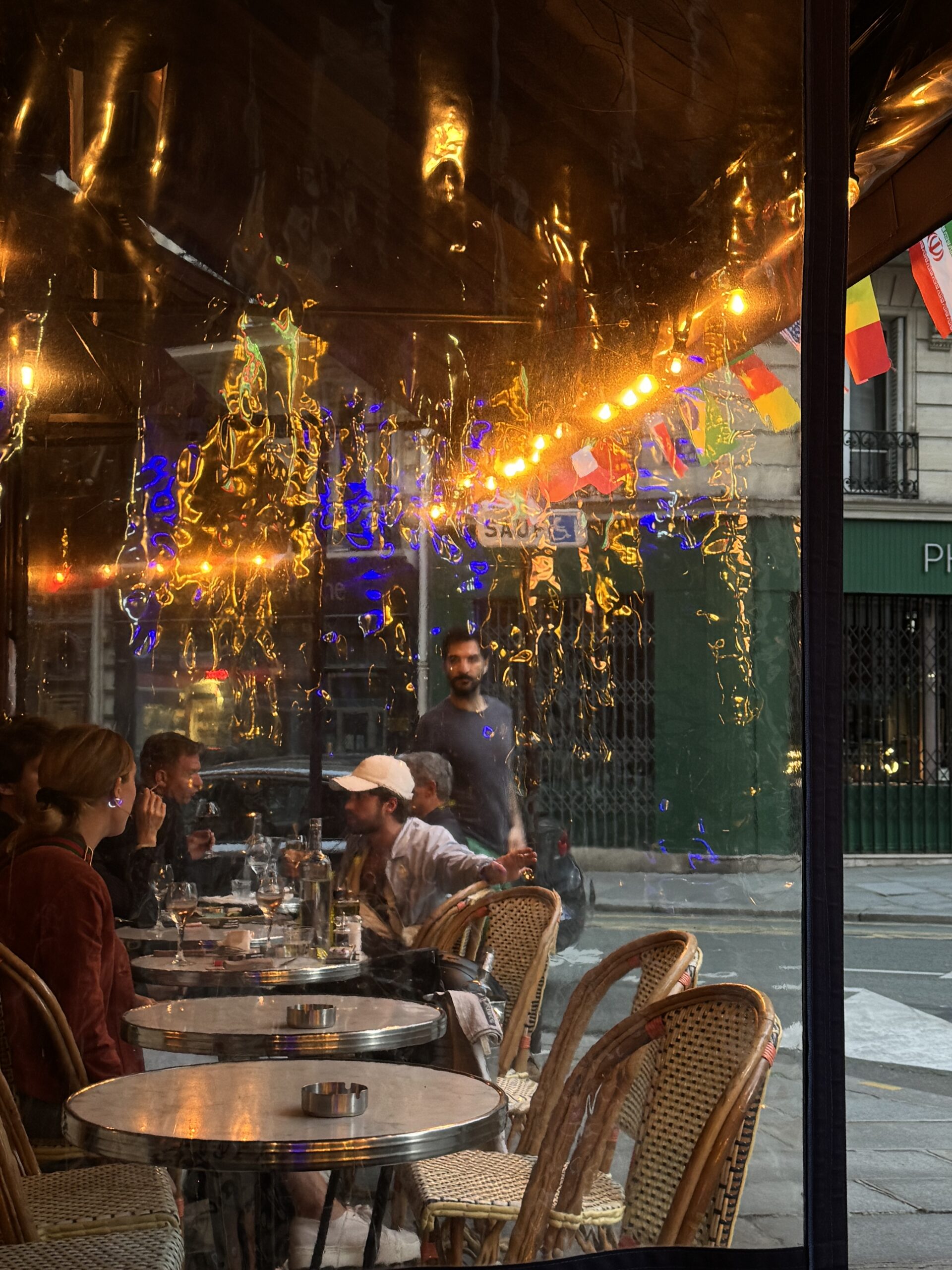Everything is an experience.
Another way of putting it is everything is a packaging of reality. Everything is a presentation of reality, a presentation, not the thing itself. It’s strange, the thing itself cannot be known unless it’s presented. And in the presentation there’s always something lost.
But it has to be like that with the thing. The thing in itself is impossible, it’s permanent, it’s timeless, it’s eternal, it’s boundless. So, how are you going to have a conversation about it? So, in the packaging there’s always something lost, right? So, that’s really all you need to say and leave it. But, forgive me on a beautiful, clear Paris Saturday afternoon, walking here in a tunnel really, flanked by old housemen, architectured apartments, three, four stories tall.
And above me is this beautiful blue sky with, you know, just rich, glorious clouds. They’re not, they’re in no way thin. And festive, which is also not the word. They just speak of, I think, for me they feel fertile and festive. But not in the, yeah. Anyway, forgive me on a day like today to consider that if I can choose my experience, then shall I not choose one that is resplendent with joy and happiness and possibility?
And that is what I choose to do, walking these streets. That, given life as it is, that there is no ultimate joy and there’s no ultimate sorrow. There is no ultimate yes and there’s no ultimate no. That I shall choose to walk in a world where I can be present in this way. It’s hard to explain, right? Because I know there’s another packaging of reality that comes later, that comes like clockwork. And that’s one that is, it considers itself to be quite sane and like reasonable.
And like, oh wait, now we’re real. Now we’re back to the way it is, you know. And you consider, well, you’re going to get old. And what are you going to do with, you know, if you don’t have enough money or you can’t take care of yourself. Or if you are diagnosed with cancer. Those, what is considered to be realistic thoughts, this is considered to be somewhat of an escapist thing, you know.
Where you, you know, maybe get involved with some, what they call a mind-altering substance. Whether it’s alcohol or some other thing. And this is considered to be some escape. It’s an escape. It’s how it’s seen. Like now we’re back to the real facts, the real facts of life. Given everything as it is, would I choose this? Or should I choose it? Why would I choose a world that is so narrow? Is it really the truth? Well, no. Is this really the truth? No.
But if we get to choose our truth, what do we choose?
You see what I mean? Wouldn’t you want to just be a little bit more alive? And less cautious, less guarded, less, I don’t want to say imprisoned. It’s maybe too strong a word. But constrained. Constraining that, you know, it’s the old story. Would you rather be in the harbor or in the open sea, right?
I mean, and it’s not a, it’s not a moral question. It’s not a question of right or wrong. It really, really, really isn’t. It’s a question of life and the quality of it. But it’s not reasoned. It’s not reasoned. Even here, the feeling is that there’s, the subtext to all of this is that there’s a choice that needs to be made.
And even if you grant that, which is fine. Then the question is, what method or criteria or approach, what heuristic do you use to answer the question? And it seems like there’s a dichotomy constructed, which is, who knows if it’s real. I don’t think it is. I don’t think it is.
That, well, you have to reason your way to it. What if you let go of reason? It’s not necessarily so. Just like in religious studies, there’s always a thought that if you let go of God, you’ll be godless. In that meaning, godlessness means a complete giving over to an utter immoral life, dissipation. There’s no values. That’s not true. I’ve yet to meet anybody who doesn’t have values. And most people are quite aware of their own role in society. And being human is to have a sense of self and other.
But let’s not get in there. The point is simply that it’s very similar to that. That when you get to this place, when you think, if you let go of the mind and if you consider, how do I make a choice and a decision without thinking and without choosing? Wouldn’t that be like an utter disaster? That’s the full feeling.
Says who? Certainly there are examples of that, but I don’t really know. I mean, it just looks like that for me. I mean, I’m not sure. I will just say for this one, it’s all the more clear to me that I will walk the streets of Paris in various states of sobriety or inebriation, various states of intoxication, to use those words, or clarity.
And no matter which side I’m on, I feel that I’m just here. If I want to drink, I drink. If I don’t want to drink, I don’t drink. There is always the question of addiction. That’s a question. But even that, I don’t know. One man’s addiction is another man’s beautiful blue cloud on a Saturday afternoon.
With all the nonsense of the world suspended and shoved aside. And I’ll say this at the close of all of this, without, as far as I can see, without needing to moralize anything, I do see the joy of a head that’s clear. The joy of a head that’s walking without needing to be altered, without having been altered by anything.
Lack of sleep. Too much work. Just here. Let me be clear here. A mind that doesn’t consider itself subject to anything. It’s not even subject to what we call normal thinking. It’s not subject to what I’ve called Mr. Dr. Day. Neither is it subject to Dr. Night. If it’s Dr. Night, it’s fine. If it’s Mr. Night, it’s fine. If it’s Dr. Day, it’s fine.
It sees that soon this kind of conversation will just go away. It’ll just disappear. Why not let it? Without regard to anything else. It’s almost like it’s the transcendent third, right? False dichotomy is who’s right? Dr. Day or Mr. Night? Neither and both. Neither and both. See what I’m saying? Neither and both. Let’s take that into the night.

